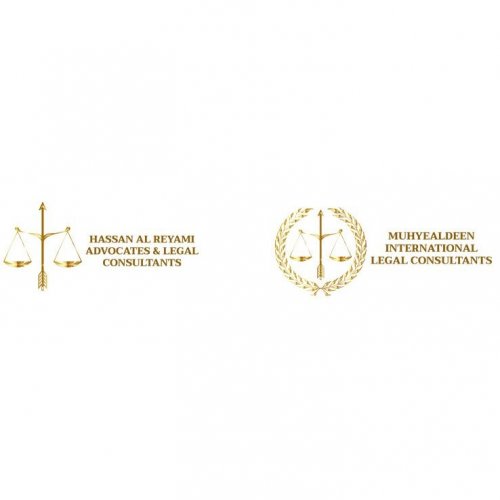Best Energy, Environment & ESG Lawyers in Abu Dhabi
Share your needs with us, get contacted by law firms.
Free. Takes 2 min.
List of the best lawyers in Abu Dhabi, United Arab Emirates

The Black Robe For Legal Consultancy & Debit Collection
1 hour Free ConsultationAbout Energy, Environment & ESG Law in Abu Dhabi, United Arab Emirates
Abu Dhabi, the capital of the United Arab Emirates (UAE), is globally recognized for its oil and gas resources but has increasingly embraced energy diversification, sustainable development, and environmental responsibility. Laws and regulations concerning Energy, Environment, and ESG (Environmental, Social, and Governance) focus on guiding businesses and individuals towards responsible resource use, minimization of environmental impact, and commitment to sustainable and ethical practices. The government is also driving initiatives supporting clean energy, such as Masdar City, and aligning with global standards for environmental protection and social responsibility.
Why You May Need a Lawyer
There are several situations where engaging a legal professional with expertise in Energy, Environment, and ESG law in Abu Dhabi can be essential. Common scenarios include:
- Starting or expanding energy projects (conventional or renewable)
- Seeking environmental permits for industrial or development activities
- Navigating the regulatory requirements for construction or operation near protected areas
- Ensuring compliance with stringent waste management or pollution control laws
- Addressing allegations of environmental violations or disputes with authorities
- Advising on ESG compliance and reporting obligations, particularly for large corporations or entities accessing global markets
- Handling transactions, mergers, or acquisitions in energy and utilities, where environmental due diligence is key
- Understanding obligations for carbon emissions, water usage, or energy efficiency standards
Local Laws Overview
Abu Dhabi applies a mix of federal UAE laws and local emirate-level regulations concerning Energy, Environment, and ESG:
- Federal Laws: The UAE Federal Law No. 24 of 1999 on Protection and Development of the Environment is a foundational statute setting out environmental protection, pollution prevention, waste management, and environmental impact assessment (EIA) obligations. Other federal regulations address hazardous materials, emissions, and conservation.
- Local Regulations: Abu Dhabi Local Law No. 21 of 2005 and its regulatory framework, primarily enforced by the Environment Agency Abu Dhabi (EAD), are vital for activities affecting air, water, and land. Additionally, the Department of Energy (DoE) governs sectoral energy regulation.
- Renewable Energy and Sustainability: Abu Dhabi has specific strategies and directives for renewable energy projects, energy efficiency, water conservation, and sustainability, often linked to Vision 2030 and international agreements.
- ESG Compliance: ESG is increasingly relevant for companies listing on Abu Dhabi Securities Exchange (ADX) and those participating in government tenders. ESG criteria are also applied in investment and corporate governance decisions under both mandatory and voluntary frameworks.
Frequently Asked Questions
What permits are required for starting an energy project in Abu Dhabi?
Most energy projects, whether oil, gas, or renewable, require multiple permits from government bodies such as the Department of Energy, Environment Agency Abu Dhabi, and relevant municipalities. Specific requirements depend on the project type, location, and scale.
What is an Environmental Impact Assessment (EIA) and is it mandatory?
An EIA is a study required by law for projects that may have significant environmental impacts. It is mandatory for most industrial, construction, and development projects in Abu Dhabi, and approval is required before commencement.
What are the key regulations governing waste management?
Waste management is primarily regulated under Federal Law No. 24 of 1999 and enforced locally by Tadweer (Abu Dhabi Waste Management Center). There are strict rules for handling, transporting, and disposing of all waste, particularly hazardous and medical waste.
Does Abu Dhabi have regulations for renewable energy?
Yes, Abu Dhabi has several regulations and incentive schemes to promote solar, wind, and waste-to-energy projects. The Department of Energy and national strategies provide frameworks for investment, standards, and licensing.
How are carbon emissions regulated?
While Abu Dhabi does not currently have a carbon trading system, emissions are regulated through specific limits and reporting obligations. Major projects must outline mitigation methods in their EIA, and the government encourages voluntary carbon reduction strategies.
Is ESG reporting mandatory for companies in Abu Dhabi?
ESG reporting is not universally mandatory for all companies. However, publicly listed companies, especially on ADX, must comply with certain ESG disclosures. Increasingly, companies contracting with the government or those seeking international investment face ESG reporting requirements.
What are the penalties for violating environmental laws?
Penalties can include fines, operational suspensions, mandatory corrective actions, and in severe cases, criminal liability for responsible individuals. The magnitude of penalties depends on the nature and seriousness of the violation.
Can environmental disputes be resolved outside of court?
Yes, mediation and administrative dispute resolution mechanisms exist, particularly for cases involving regulatory authorities. However, judicial recourse is available for unresolved disputes.
How can a business ensure ongoing compliance with ESG standards?
A business can conduct regular audits, seek advice from compliance specialists, implement clear internal policies, and engage legal counsel familiar with local and international ESG standards to ensure ongoing compliance.
Are there incentives for adopting sustainable or green practices?
Yes, Abu Dhabi provides various incentives such as grants, subsidies, or reduced tariffs for businesses and individuals investing in renewable energy, energy efficiency, or sustainable development projects.
Additional Resources
Those seeking more information or guidance may find the following resources helpful:
- Environment Agency Abu Dhabi (EAD): Regulates and oversees environmental matters
- Department of Energy (DoE): Governs energy sector standards and licensing
- Abu Dhabi Waste Management Center (Tadweer): Handles waste management regulation and compliance
- Abu Dhabi Securities Exchange (ADX): Sets out ESG disclosure requirements for listed companies
- Ministry of Climate Change and Environment (MOCCAE): Federal authority for climate and sustainability policies
- Masdar: Platform for sustainability initiatives and renewable energy innovation
- Chamber of Commerce: Offers support for local businesses navigating regulatory frameworks
Next Steps
If you require legal assistance with Energy, Environment, or ESG matters in Abu Dhabi, here are the recommended next steps:
- Identify the specific nature of your legal need, such as permits, compliance, environmental disputes, or ESG advice
- Gather all relevant documentation and information about your project or business
- Consult with a qualified local lawyer specializing in Energy, Environment, and ESG law
- Consider engaging in an initial advisory session to understand your rights, obligations, and the legal landscape
- Stay updated with regulatory changes, as the legal environment is dynamic and subject to periodic updates
- Utilize official resources and government agencies for additional support and information
Professional legal guidance is invaluable for navigating complex regulations and avoiding costly mistakes. Taking early advice can help secure permits, achieve compliance, and position your business or project for sustainable and successful operation in Abu Dhabi.
Lawzana helps you find the best lawyers and law firms in Abu Dhabi through a curated and pre-screened list of qualified legal professionals. Our platform offers rankings and detailed profiles of attorneys and law firms, allowing you to compare based on practice areas, including Energy, Environment & ESG, experience, and client feedback.
Each profile includes a description of the firm's areas of practice, client reviews, team members and partners, year of establishment, spoken languages, office locations, contact information, social media presence, and any published articles or resources. Most firms on our platform speak English and are experienced in both local and international legal matters.
Get a quote from top-rated law firms in Abu Dhabi, United Arab Emirates — quickly, securely, and without unnecessary hassle.
Disclaimer:
The information provided on this page is for general informational purposes only and does not constitute legal advice. While we strive to ensure the accuracy and relevance of the content, legal information may change over time, and interpretations of the law can vary. You should always consult with a qualified legal professional for advice specific to your situation.
We disclaim all liability for actions taken or not taken based on the content of this page. If you believe any information is incorrect or outdated, please contact us, and we will review and update it where appropriate.
Browse energy, environment & esg law firms by service in Abu Dhabi, United Arab Emirates
Abu Dhabi, United Arab Emirates Attorneys in related practice areas.












